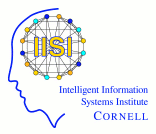NESCAI: North East Student Colloquium on Artificial Intelligence28-29 April 2006, Ithaca, NY |
|
|
Important Dates Driving Directions Schedule Tutorials Invited Talks Author Guidelines Final Submissions Call for Papers Why come? Registration Program Committee Contact Info Sponsored By 
 |
Invited TalksThere will be two invited talks, both on Saturday. Modeling Complex Networks, Jon Kleinberg (Cornell Univ.) Machine Learning and Human Learning, Tom Mitchell (CMU) Modeling Complex Networks, Jon Kleinberg (Cornell Univ.) Abstract The study of complex networks has emerged over the past several years as a theme that spans many disciplines, reaching from computing and information science to the social and biological sciences. Indeed, a shared interest in network structure is arguably one of the forces that is helping draw many of these disciplines closer together. Modeling large-scale networks poses challenges for a range of areas across computer science, with significant aspects of the complexity arising from the way in which different networks become intertwined with one another and with their environments. Social and technological networks are becoming increasingly dependent on one another, and both types of networks are fundamentally embedded in time, space, and organizational structure. I'll discuss how these issues arise in the context of search problems and `small-world' effects in networks, focusing on some basic models that capture the notion of a network embedded in different underlying structures, and the surprising extent to which these models are reflected in recent experimental data. I'll also discuss some recent studies of how large-scale networks evolve over time, including a few findings that suggest the limitations of our current models.Speaker Biography Jon Kleinberg received his Ph.D. in computer science from MIT in 1996; he subsequently spent a year as a Visiting Scientist at the IBM Almaden Research Center, and is now a Professor in the Department of Computer Science at Cornell University. His research interests are centered around algorithmic issues at the interface of networks and information, with an emphasis on the network structures that underpin the Web and other on-line media. He is the recipient of an NSF Career Award, an ONR Young Investigator Award, research fellowships from the MacArthur, Packard, and Sloan Foundations, teaching awards from the Cornell Engineering College and Computer Science Department, and the 2001 National Academy of Sciences Award for Initiatives in Research. WWW: http://www.cs.cornell.edu/home/kleinber/ Machine Learning and Human Learning, Tom Mitchell (CMU) Abstract For the past 30 years, researchers studying machine learning and researchers studying human learning have proceeded pretty much independently. We now know enough about both fields that it is time to re-ask the question: "How can studies of human learning and studies of machine learning inform one another?" This talk will address this question by briefly covering some of the key facts we now understand about both machine learning and human learning, then examining in some detail several specific types of machine learning which may provide surprisingly helpful models for understanding aspects of human learning (e.g., reinforcement learning, cotraining). Speaker Biography Tom M. Mitchell is the Fredkin Professor and Department Head in the Machine Learning Department at Carnegie Mellon University. His research lies in the areas of machine learning, artificial intelligence, and cognitive neuroscience. Mitchell is author of the textbook "Machine Learning," Chair of the American Association for the Advancement of Science (AAAS) section on Information, Computing and Communication, and Past President of the American Association for Artificial Intelligence (AAAI). He is also the founding Department Head of CMU's new Machine Learning department, which offers the world's first PhD program in "Computational and Statistical Learning." Mitchell's current research focuses on machine learning approaches to analyzing human brain function based on fMRI data, and on machine learning for text data. |